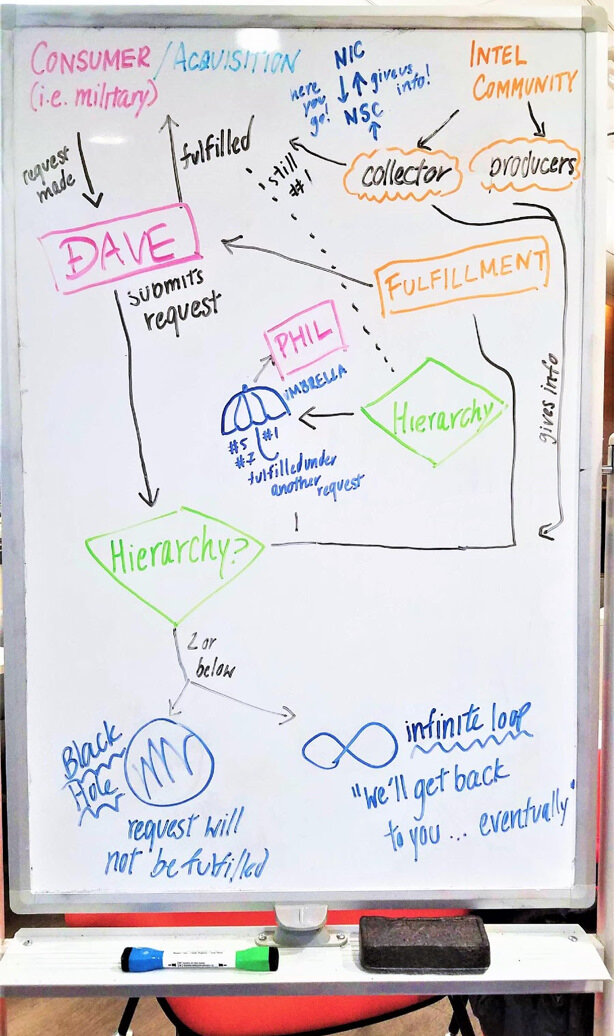Team 007
Team 007
The Ohio State University
Linking Incompatible Systems to Streamline Communication Across the Intelligence Community
The Team
Jackie Carlin
• Former Account Manager at DeanHouston, Inc.
• MPA Candidate from the Ohio State University
• MBA from the Ohio State University
• BA in Strategic Communication from Miami University
Michael Dumitrescu
• BA in Chemical and Biomolecular Engineering from the Ohio State University
Maya Perlmutter
• Undergraduate Research Assistant, OSU Battelle Center for Science, Engineering and Public Policy
• BS in Psychology and BA in Japanese
Cassie Boutelle
• Master of Public Health Candidate, Emory University
• BS in Industrial and Systems Engineering
Problem Sponsor
Office of the Undersecretary of Defense for Intelligence & Security
Original Problem Statement
The Office of the Undersecretary of Defense for Intelligence needs visibility into the intelligence fulfillment process in order to confidently respond to requests for information.
Beneficiary Discovery Interviews
92
The Innovation
At the beginning of the semester, Team 007 was tasked with “increasing visibility in the intelligence fulfillment process” within the intelligence community. Initially, the team felt overwhelmed by the broadness of this topic. However, through nearly 100 beneficiary discovery interviews, Jackie, Michael, Maya and Cassie from Team 007 collected and analyzed the experiences of subject matter experts, stakeholders, and beneficiaries to figure out the root of this issue.
The team quickly discovered that the lack of visibility into the intelligence fulfillment process comes from incompatible management and collaboration systems. This mismatch in systems prevents intelligence analysts from communicating with one another about relevant information. One intelligence analyst stated:
“Collaboration would be so much easier if I even had the name of another analyst working on this topic.”
Once Team 007 team identified the root cause of the problem, incompatible collaboration systems, the team used Lean Innovation tools and the human-centered design process to brainstorm a variety of potential solutions. Each week, the team had multiple hypotheses that continuously evolved through their beneficiary discovery. Ultimately, the team was able to confirm their hypothesis and decided the most effective solution to this problem would be their proposed production management system, “Nile”.
Nile is an application that will bridge the gaps between the existing systems in the intelligence community. The goal of this application is to increase knowledge management capabilities through communication interfaces and a data archiving system. The team compared the problems faced within the intelligence community to the issues faced within a retail distribution center, and “Nile” would allow communication between those making the “deliveries” or fulfilling requests for information. As the team continued to develop their MVP, the team had the opportunity to travel to present their wire-frame to stakeholders at NASIC, the DIA, and the Pentagon, and used the feedback to further refine their ideas. These trips to Dayton, OH and Washington, DC proved invaluable to their final product.
Despite strong sponsor feedback, the team does not currently have plans to continue their work on this project beyond the semester. However, the team has indicated a strong interest in continuing to support their sponsoring organization or further pursuing the project at some point in the future.
With each new hypothesis, the team literally went “back to the drawing board”.
Presentation
Team 007’s
Hacking for Defense Experience
“Failing Fast” Through Beneficiary Discovery
Master of Public Administration student Jackie praised Hacking for Defense as “One of the best classes I have taken in my academic career. I am really happy I was able to experience it.” She further explained how the course taught her and her teammates “how to let yourself be wrong.” Through many iterations of the team’s hypothesis, Jackie realized being wrong is an essential part of the process. Her attitude throughout the discovery portion of the project was: “If you’re wrong, okay you’re wrong.” This attitude allowed the team to take risks and quickly find a way to pivot to find another solution. The course taught her to “put yourself out there and let people talk you through things… accept that you don’t know everything (so you are able to learn.)”
Teammate Maya Perlmutter was motivated by the overall mission of the course to continue working hard on her project. Aligned with the Common Mission Project belief that mission driven entrepreneurship is a new form of national service, Maya stated: “Knowing that it (our solution) would help someone in the future definitely motivated me throughout this course.”
Both Cassie and Michael are interested in working in the public sector in the future. This course gave the team significant exposure to public sector work and confirmed their interest in pursuing a career in government.
The entire team cited the course and their experience traveling to conduct beneficiary discovery interviews in Dayton, OH and Washington, DC as a highlight of their academic experience.







